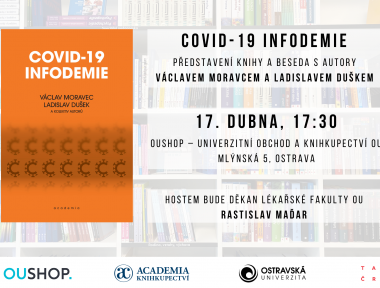Last year in October, a new educational platform for doctoral students of all OU faculties was launched. The Doctoral School includes such courses that significantly increase the general competencies of doctoral students in the field of creative activity and are suitable for virtually all doctoral study programs. In addition, the Doctoral School offers students the opportunity to build interdisciplinary connections, share good practice and gain a more general awareness of creative activities at the OU.
In the summer semester, the ones who are interested may register for four interesting courses:
- Academic English (REK/ACENG) – the course is aimed at the language skills development of students that is indispensable in the academic environment. The course participants work on the development of independent spoken and written expression and communication skills by simulating real communication situations and focus on interactive aspects of academic genres. The content of the course reflects the current language competence, needs and scientific orientations of its participants and is divided into two entry levels (B1 and B2).
Students who did not attend the course in the winter semester may register for it.
More information can be found in the course in Moddle system: Academic English, password: aenglish
Presented by: Mgr. Lucie Bártová-Vopravilová
- Academic Writing (REK/AKPUB) – the course explains to students the process of preparation of a professional text in English with an emphasis on the specific organization and style of scientific articles. Students will get acquainted with basic characteristics of the culture of academic writing in English and thus gain the academic literacy. They will practice individual steps in the writing process at the macro and micro levels and will learn key habits, such as time planning, setting goals for the work and the writing process, understanding the needs and expectations of the target audience. At the same time, they will practice rhetorical procedures in the formulation of research questions and hypotheses when defining their own research and when editing texts. Students will learn to use scientific English correctly and effectively not only at the language level of the text, but also in the selection and implementation of various text strategies, and will learn the ethical rules of academic writing in English.
More information can be found in the course in Moddle system: Academic Writing, password: the lecturer will inform you
Presented by: Mgr. et Mgr. Jan Beneš, Ph.D., Department of English and American Studies, Faculty of Arts
- Methodology of Qualitative Research (REK/MKVAL) – the course prepares the students for an independent implementation of qualitative research. The student will learn to develop a design proposal for qualitative research containing the rationale for choosing the appropriate research approach/method, data collection techniques and methods of selecting informants. After passing the course, the student will be able to evaluate the ethical dilemmas arising from the proposed research procedures and work with them in accordance with research ethics. He/she will be able to evaluate the time and financial demands of the research. The student will be able to evaluate the advantages and limits of the chosen qualitative research strategy and methods used, and reflect these in the processing, analysis and interpretation of data. The student will be able to use specialized software to analyze qualitative data.
Presented by: prof. Mgr. Soňa Kalenda, Ph.D., Department of Social Work, Faculty of Social Studies
- Methodology of Quantitative Research (REK/MKVAN) – the main goal of the course is to use the existing knowledge of scientific methodology, so that the students are able to design the methodology of observational studies and manipulative experiments based on the formulated hypotheses. The students will understand the importance of data collection methodology preparation and will be able to use the principles of experimental design in practice. The emphasis will be put on the differences between numerical, significant and factual dependencies. The theoretical part will be followed by practical exercises aimed at clarifying classical and more advanced methods and the interpretation of the results of quantitative research and their representation.
Presented by: doc. RNDr. Petr Bujok, Ph.D., Department of Informatics and Computers, Faculty of Science and doc. Mgr. Pavel Drozd, Ph.D., Vice-Dean for Research, Faculty of Science
Registration for the courses can be done after logging in to the UO Portal. Individual courses can be found in the system under the abbreviation of the given subject (eg. abbreviation unit REK + course abbreviation, for example: AKPUB).
You can get all necessary information about the Doctoral School in the course of the same name in the MOODLE system where, among other things, a discussion forum is open for doctoral students.
In MOODLE, you can find also useful information about science at OU in the course called “Science Guide at UO”.
If needed, you can send an email to denisa.simickova@osu.cz or contact your study officer.


 4 min.
4 min. 


